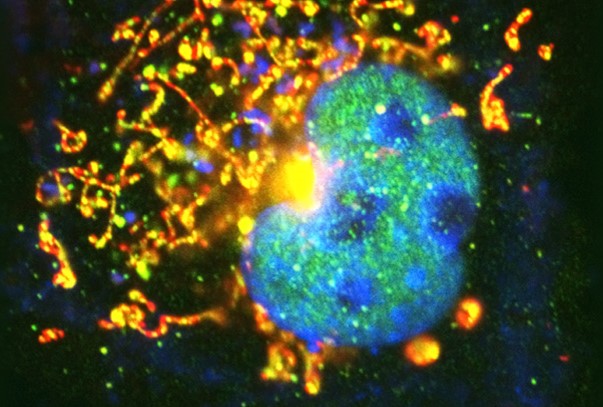Elucidating the molecular mechanism of ARTS-induced cell death to restore selective self-destruction of cancer cells
Main Researcher: Prof. Sarit Larisch
Background
All cells in our body have the ability to self-destruct by activating an intrinsic cell death program called “apoptosis”. In this way, the accumulation of damaged and potentially dangerous cells, such as tumor cells, is greatly limited.
Unfortunately, cancer cells can acquire resistance towards cell death by inactivating cell suicide pathways, thereby gaining the ability for “unlimited” life and propagation. However, the ability to undergo apoptosis is not completely lost in cancer cells and most currently used anti-cancer therapies (chemotherapy, radiation) act by activating this apoptosis death pathway in cancer cells.
ARTS-induced tumor cell death R&D
Prof. Sarit Larisch's lab focuses on investigating the molecular mechanisms of cell death, and how abnormal regulation of this process contributes to human diseases. She identified a mitochondrial pro-apoptotic protein termed ARTS (Sept4_i2) that is derived from the Sept4 septin gene by differential splicing.
Over-expression of ARTS is sufficient to promote apoptosis in many cultured tumor cells.
Conversely, the reduction of endogenous ARTS protein by anti-sense or shRNA methods can protect cells against various pro-apoptotic insults.
This indicates that ARTS is important for induction of apoptosis in a wide variety of apoptosis paradigms. A central step for the execution of apoptosis is the activation of caspases, a family of enzymes that when activated bring about the demise of the cell. Caspases are regulated by both activators and inhibitors, such as IAPs (Inhibitor of Apoptosis Proteins).
The best characterized member of this family is X-IAP (X-linked IAP). ARTS is located at the mitochondrial outer membrane (MOM) in living cells, but in response to pro-apoptotic stimuli it translocates to the cytosol. This permits ARTS to bind and inhibit XIAP, thereby initiating caspase activation and apoptosis. Recently, we have shown that ARTS promotes apoptosis by degrading another major anti-apoptotic protein, BCL-2 (B Cell Lymphoma 2). Many types of cancers express high levels of Bcl-2 and XIAP, contributing to the ability of these cancer cells to avoid cell death and become cancerous. Indeed, both XIAP and BCL-2 have become targets for developing anti-cancer therapies. ARTS is currently the only protein that directly binds and causes degradation of both XIAP and Bcl-2 leading to caspase activation and cell death.
ARTS expression is frequently lost in Acute Lymphoblastic Leukemia (ALL) and in lymphoma patients, indicating that ARTS functions as a tumor-suppressor protein. Furthermore, Sept4/ARTS-null mice exhibit spontaneous tumors and show accelerated tumor development. In addition, Sept4/ARTS-null mice display increased numbers of stem and progenitor cells, which exhibits increased resistance to cell death. Taken together, these results firmly establish the physiological role of ARTS as an XIAP and a novel Bcl-2 antagonist, and a tumor suppressor protein.
Research Status
Prof. Larisch's lab currently focuses on investigating the following:
• Molecular mechanisms of ARTS-induced apoptosis; the multiple signaling pathways by which ARTS promotes apoptosis and necroptosis; the transcriptional regulation of ARTS and its regulation of various other tumor suppressors.
• The role of ARTS as a tumor suppressor in a wide variety of cancer models.
• Characterizing the molecular cell death pathways induced by ARTS small-molecule mimetics.
Carmel established ARTSaVIT ltd, based on Prof. Larisch Research to advance and commercialize this technology, with a seed investment from the Carmel Innovations Fund.
Related pages
Prof. Sarit Larisch - researcher page


